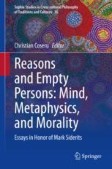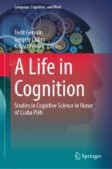Search
Search Results
-
Representationalism Versus Anti-Representationalism About Perceptual Experience and in Cognitive Science
This chapter and the next form of unit. In this one, I present and explore two further representationalist versus anti-representationalist debates...
-
Cognitive Diminishments and Crime Prevention: “Too Smart for the Rest of Us”?
In this paper, I discuss whether it is ever morally permissible to diminish the cognitive abilities or capacities of some cognitively gifted...
-
Ecological Psychology, Enaction, and the Quest for an Embodied and Situated Cognitive Science
This chapter evaluates which approach within 4E cognition is in a better position to offer a research program and a scientific framework for the...
-
Institutions as Cognitive Niches: A Dynamic of Knowledge and Ignorance
Institutions have become fashionable. There is a growing field of institutional economics, as well as more abstract studies of institutions...
-
Exploring the Cognitive Foundations of Managerial (Climate) Change Decisions
Climate change is a complex, multilevel challenge with implications of failure unimaginable for current and future generations. However, despite the...

-
What’s in a Concept? Conceptualizing the Nonconceptual in Buddhist Philosophy and Cognitive Science
A recurrent problem in the philosophical debates over whether there is or can be nonconceptual experience or whether all experience is conceptually...
-
From neurodiversity to neurodivergence: the role of epistemic and cognitive marginalization
Diversity is an undeniable fact of nature (Gaston and Spicer in Biodiversity: an introduction. Wiley, Hoboken, 2004), and there is now evidence that...
-
An operational definition of biological development
Despite the undeniable epistemic progress of developmental biology from the second half of the twentieth century to the present day, there still is...
-
Enacting the aesthetic: A model for raw cognitive dynamics
One challenge faced by aesthetics is the development of an account able to trace out the continuities and discontinuities between general experience...
-
Retiring the “Cinderella view”: the spinal cord as an intrabodily cognitive extension
Within the field of neuroscience, it is assumed that the central nervous system is divided into two functionally distinct components: the brain,...

-
Engineering the Minds of the Future: An Intergenerational Approach to Cognitive Technology
The first part of this article makes the case that human cognition is an intergenerational project enabled by the inheritance and bequeathal of...
-
Hobbes’s Development, Personality, and Motivation
Creative genius requires intelligence but intelligence is not enough. Most intelligent people are satisfied with mastering and working in a specific...
-
The Cognitive Approach
This chapter presents some of the main theories and assumptions of cognitive science of religion (CSR). The main CSR theories and concepts discussed...
-
A new rationalist account of the development of false-belief understanding
Rationalists accounts of the development of folk-psychology maintain that the acquisition of this capacity is aided by special-purpose mechanisms...
-
The Cognitive Science of the Ranking Game
We like to see who is stronger, richer, better, more clever. Since we humans (1) love lists; (2), are competitive, and (3) are jealous of other...
-
Towards a Situated Cognitive Approach of Olfactory experiences and Languages
In a series of investigations in everyday life situations in different cultures and languages, in expert professional practices (of perfumers) as...
-
Chapter I: Cognitive Tools
The fundamental challenge facing any attempt to build a theory of the human is to develop a methodology assuring that the individual and social...
-
From Maximal Intersubjectivity to Objectivity: An Argument from the Development of Arithmetical Cognition
One main challenge of non-platonist philosophy of mathematics is to account for the apparent objectivity of mathematical knowledge. Cole and Feferman...
-
SAF: Stakeholders’ Agreement on Fairness in the Practice of Machine Learning Development
This paper clarifies why bias cannot be completely mitigated in Machine Learning (ML) and proposes an end-to-end methodology to translate the ethical...

